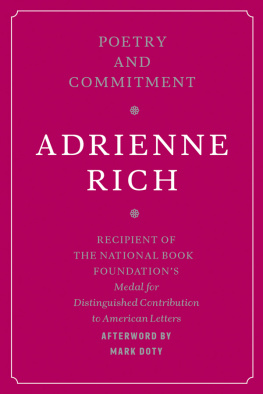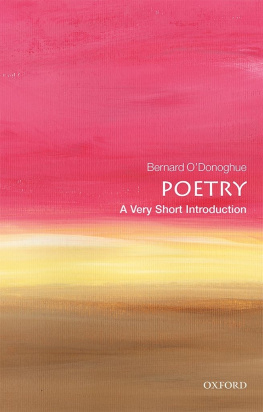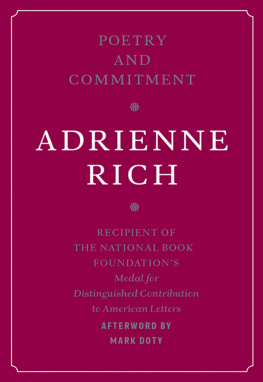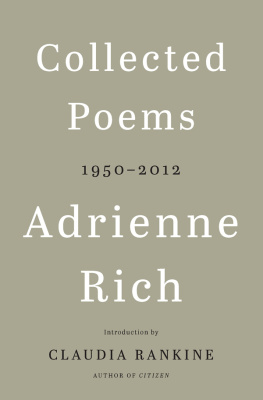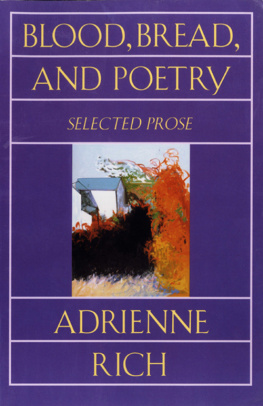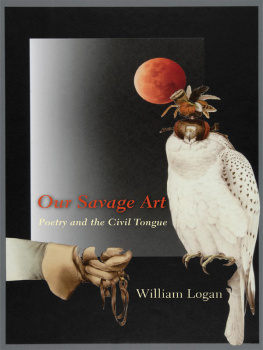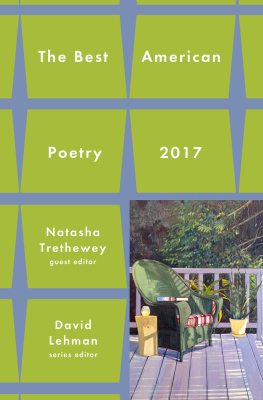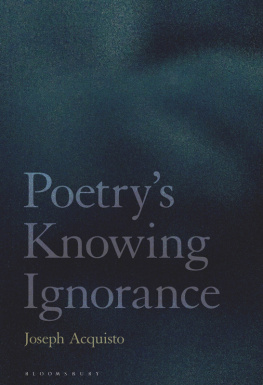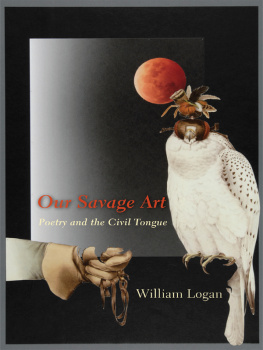
Poetry and Commitment was first presented as the plenary lecture at the 2006 Conference on Poetry and Politics, Stirling University, Scotland. Adrienne Rich read a briefer version on the occasion of accepting the National Book Foundation Medal for Distinguished Contribution to American Letters.
POETRY & COMMITMENT
AN ESSAY
ADRIENNE RICH
with an Afterword by Mark Doty
W W Norton & Company New York London
Adjusting type size may change line breaks. Landscape mode may help to preserve line breaks.
POETRY & COMMITMENT
1
Poets, readers of poetry, strangers and friends, Im honored and glad to be here among you.
Theres an invisible presence in this room, whom I want to invoke: the great Scottish Marxist bard Hugh MacDiarmid. Ill begin by reading from his exuberant, discursive manifesto called, bluntly, The Kind of Poetry I Want. Ill offer a few extracts and hope youll read the whole poem for yourselves:
A poetry the quality of which
Is a stand made against intellectual apathy,
Its material founded, like Grays, on difficult knowledge
And its metres those of a poet
Who has studied Pindar and Welsh poetry,
But, more than that, its words coming from a mind
Which has experienced the sifted layers on layers
Of human livesaware of the innumerable dead
And the innumerable to-be-born
A speech, a poetry, to bring to bear upon life
The concentrated strength of all our being
Is not this what we require?
A fineness and profundity of organization
Which is the condition of a variety enough
To express all the worlds
In photographic language, wide-angle poems
A poetry like an operating theatre
Sparkling with a swift, deft energy,
Energy quiet and contained and fearfully alert,
In which the poet exists only as a nurse during an operation
A poetry in which the images
Work up on each others shoulders like Zouave acrobats,
Or strange and fascinating as the Javanese dancer,
Retna Mohini, or profound and complicated
Like all the work of Ram Gopal and his company
Poetry of such an integration as cannot be effected
Until a new and conscious organization of society
Generates a new view
Of the world as a whole
A learned poetry wholly free
of the brutal love of ignorance;
And the poetry of a poet with no use
For any of the simpler forms of personal success.
A manifesto of desire for a new and conscious organization of society and a poetic view to match it. A manifesto that acknowledges the scope, tensions, and contradictions of the poets undertaking. Lets bear in mind the phrases difficult knowledge, the concentrated strength of all our being the poem as wide-angled, but also the image of the poet as nurse in the operating theater: fearfully alert.
2
What Id like to do here is touch on some aspects of poetry as its created and received in an even more violently politicized and brutally divided world than the one MacDiarmid knew. This wont be a shapely lecture; rather, Ill be scanning the terrain of poetry and commitment with many jump cuts, hoping some of this may rub off in other sessions and conversations.
To begin: what do I mean by commitment?
Ill flash back to 1821: Shelleys claim, in The Defence of Poetry, that poets are the unacknowledged legislators of the world. Piously overquoted, mostly out of context, its taken to suggest that simply by virtue of composing verse, poets exert some exemplary moral powerin a vague unthreatening way. In fact, in his earlier political essay A Philosophic View of Reform, Shelley had written that Poets and philosophers [italics mine] are the unacknowledged etc. The philosophers he was talking about were revolutionary-minded: Thomas Paine, William Godwin, Voltaire, Mary Wollstonecraft.
And Shelley was, no mistake, out to change the legislation of his time. For him there was no contradiction among poetry, political philosophy, and active confrontation with illegitimate authority. This was perfectly apparent to the reviewer in the High Tory Quarterly who mocked him as follows:
Mr. Shelley would abrogate our laws. He would
abolish the rights of property. He would pull down our
churches, level our Establishment, and burn our bibles.
His poem Queen Mab, denounced and suppressed when first printed, was later pirated in a kind of free-speech movement and sold in cheap editions on street stalls in the industrial neighborhoods of Manchester, Birmingham, and London. There, it found plenty of enthusiastic readers among a literate working- and middle-class of trade unionists and Chartists. In it, Queen Mab surveys the worlds disorders and declares:
This is no unconnected misery,
Nor stands uncaused and irretrievable.
Mans evil nature, that apology
Which kings who rule, and cowards who crouch, set up
For their unnumbered crimes, sheds not the blood
Which desolates the discord-wasted land.
Nature!No!
Kings, priests and statesmen blast the human flower.
Shelley, in fact, saw powerful institutions, not original sin or human nature, as the source of human misery. For him, art bore an integral relationship to the struggle between Revolution and Oppression. His West Wind was the trumpet of a prophecy, driving dead thoughts like witherd leaves, to quicken a new birth.
He did not say, Poets are the unacknowledged interior decorators of the world.
3
Pursuing this theme of the committed poet and the action of poetry in the world: two interviews, both from 1970.
A high official of the Greek military junta asks the poet Yannis Ritsos, then under house arrest: You are a poet. Why do you get mixed up in politics?
Ritsos answers, A poet is the first citizen of his country and for this very reason it is the duty of the poet to be concerned about the politics of his country.
A Communist, he had been interned in fascist prison camps from 1947 to 1953; one of his books was publicly burned. For most of his countrymen he was indeed a first citizen, a voice for a nation battered by invasion, occupation, and civil warin poems of densely figurative beauty. As such, he was also a world citizen. His long poem Romiosini, from its own place and era, speaks to the wars and military occupations of the twenty-first century (I extract from Kimon Friars translation):
This landscape is as harsh as silence,
it hugs to its breast the scorching stones,
clasps in the light its orphaned olive trees and vineyards,
clenches its teeth. There is no water. Light only.
Roads vanish in light and the shadow of the sheepfold is made of iron.
Trees, rivers, and voices have turned to stone in the suns quicklime.
Roots trip on marble. Dust-laden lentisk shrubs.
Mules and rocks. All panting. There is no water.
All are parched. For years now. All chew a morsel of sky to choke down their bitterness.
In the field the last swallow had lingered late,
balancing in the air like a black ribbon on the sleeve of autumn.
Next page
